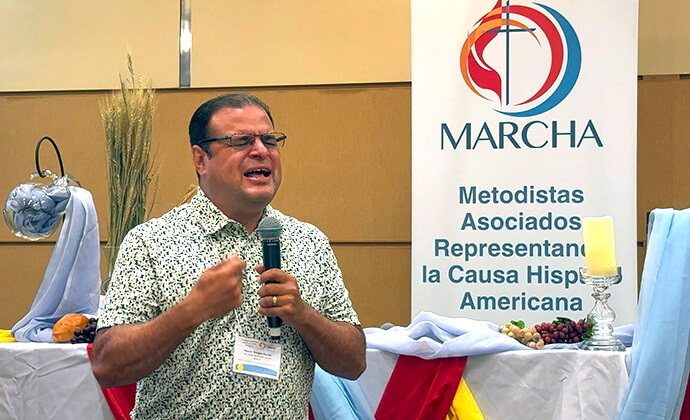Key points:
- Clergy and lay leaders from the United Methodist Hispanic-Latino community gathered under unusual security conditions in Chicago for the caucus’ 53rd annual assembly.
- The agenda focused on providing tools and information to promote community organizing within congregations, with the goal of fostering support and defending the rights of immigrants.
- Participants heard from representatives of the Immigration Law and Justice Network, El Plan for Hispanic-Latine Ministry, United Methodist seminaries and the Council of Evangelical Methodist Churches of Latin America and the Caribbean.
Clergy and lay leaders from the United Methodist Hispanic-Latino community gathered under unusual security conditions in Chicago to celebrate the 53rd annual Assembly of MARCHA (Associated Methodists for the Hispanic-Latino American Cause).
More than 100 participants gathered Aug. 1-3 under the slogan “¡Ahora Sí!” (Yes Now!), amid the social tensions created by immigration raids being carried out in different parts of the U.S., including Chicago, under the current federal government’s immigration policies. Now, Illinois Gov. JB Pritzker said the U.S. Department of Homeland Security is planning to deploy 100 National Guard troops to Chicago to protect Immigration and Customs Enforcement agents.
Coming from all jurisdictions of The United Methodist Church in the U.S. and the Methodist Church in Puerto Rico, participants gathered around an agenda focused on providing tools and information to promote community organizing within their congregations, with the goal of fostering support and defending the rights of people who are victims of government abuses and mistreatment due to their immigration status, organizers said.
In consultation with the United Methodist-affiliated Immigration Law and Justice Network, the MARCHA executive committee and event organizers designed a guide with security guidelines to reduce the risk for participants, many of whom are immigrants.
The Rev. Carlos Reyes, culture and outreach manager for the Immigration Law and Justice Network, advised that when organizing an event with the participation of people of Hispanic-Latino origin — whether immigrants or not — it is necessary to prepare special security protocols to help address, within the legal framework, any action that poses a risk of harassment, detention or any type of violation of constitutional freedoms.
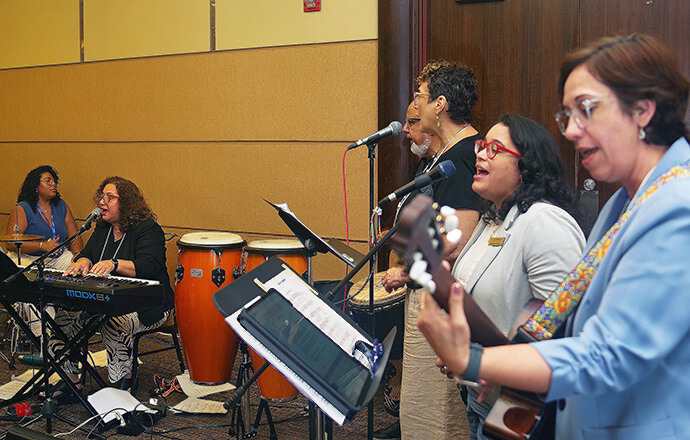
Emma Escobar, president of MARCHA, noted that the purpose of the caucus leadership at this meeting was “to connect the different realities occurring in our communities, filled with injustice, racial profiling, detentions, fear, militarization, etc., in order to prepare our leaders to continue advocating in their contexts, in their congregations, amid these new situations that have arisen since the start of the new administration.”
The Rev. Javier A. Viera, president of Garrett-Evangelical Theological Seminary in Evanston, Illinois, welcomed participants to the city of Chicago, adding that it is a privilege to be able to walk with MARCHA in its ministry of defending rights.
“At Garrett, we are convinced that the Kingdom of God is manifested through marginalized voices (like those of the Hispanic-Latino people) who today suffer the consequences of the resurgence of anti-immigrant policies, the demonization of our communities, the separation of families and constant fear,” he said. “Our faith teaches us that it is not enough to believe; we must act. It is not enough to pray; we must organize. It is not enough to have churches full; we must have hearts on fire for justice.”
The Rev. Lydia Muñoz, director of El Plan for Hispanic-Latine Ministry of The United Methodist Church, recalled that she has been participating in MARCHA for more than 35 years and emphasized El Plan’s historical relationship with the caucus.
“This year’s meeting feels even more relevant because we are currently facing persecution as a (Hispanic-Latino) community, and I believe the opportunity the caucus gives us to gather, to dialogue, share and support one another in continuing to accompany the Latino people helps us understand, from the ground up, what is happening around the (United Methodist) connection,” she said.
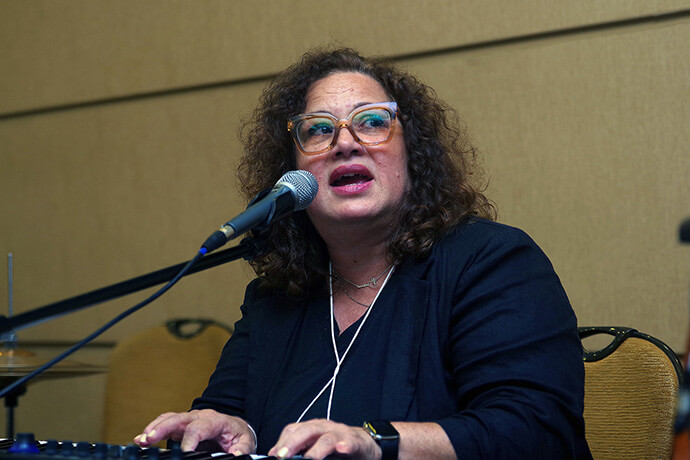
The Council of Evangelical Methodist Churches of Latin America and the Caribbean was represented by Bishop Lizzette Gabriel Montalvo of the Methodist Church of Puerto Rico, who offered greetings from the bishops and presidents of the Latin American and Caribbean Methodist churches. She recalled the historic relationship between both institutions, whose first cooperation agreements were signed in 1988 and renewed in 2014.
Bishop Dan Schwerin, episcopal leader of the Northern Illinois Conference, which hosted the event, delivered the opening sermon. He shared a message of hope in light of the difficult situation facing the Hispanic-Latino community.
Subscribe to our
e-newsletter
“Don’t be afraid,” he said, “there are more like us than like them. There are always more of God’s people than meets the eye.”
In his message based on 2 Kings, the bishop highlighted the role of the prophet Elisha and was emphatic in pointing out the falsehoods on which the government has based its narrative to justify its actions against the Hispanic-Latino immigrant community.
“If they are using the tax records of undocumented people to find them and kidnap them, then the issue was not because they did not pay taxes. If they are arresting people at their jobs, then the issue was not that they were a social burden because they did not work. If they are arresting and kidnapping them when they go to the courts, then the issue was not that they are doing things wrong. If billions are being spent on this policy, then it was never about economic recovery,” he said.
“And for those who say these actions are being done in the name of God, Jesus would surely say, ‘What you’re doing to them, you’re doing to me,’” Schwerin said.
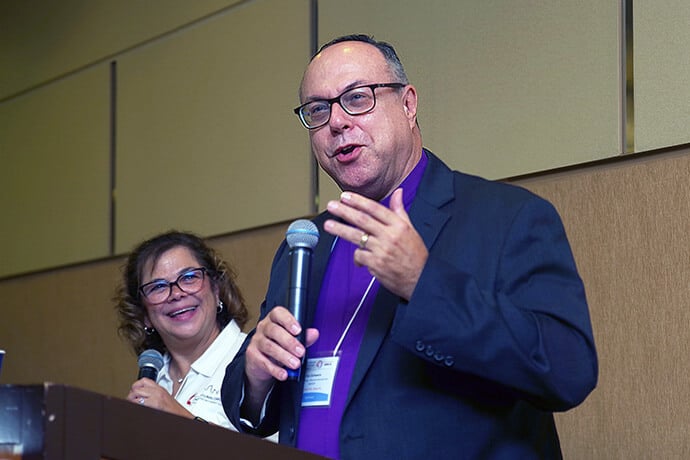
The Rev. Miguel De La Torre, professor of Social Ethics and Latinx Studies at Iliff School of Theology in Denver, led a presentation titled “Understanding Our New Landscape,” in which he provided a historical account of U.S. intervention in Latin American and Caribbean countries.
De La Torre urged churches to deconstruct the concept of hope they teach, as it neutralizes the ability to radicalize stances against the oppression and manipulation suffered by communities such as the Hispanic-Latino community.
“We must fight for justice, even when we are aware that we may lose. This fight is not simply about winning; it is a fight we must wage because it defines the faith we claim to have and defines our very humanity… We must hold the church accountable for its discourse, its rhetoric and its preaching,” he said.
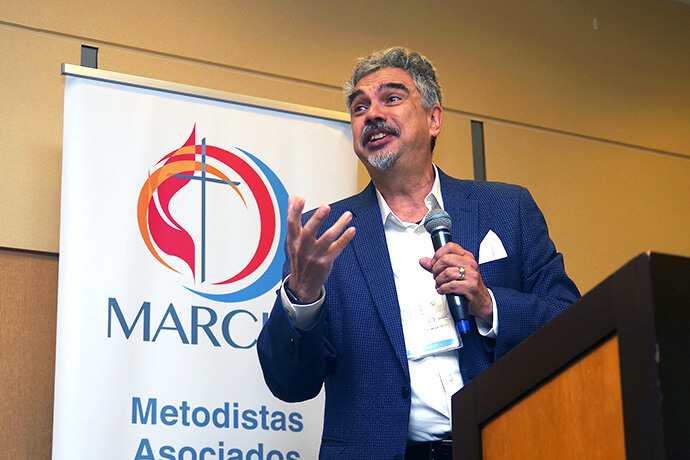
Alba Jaramillo, co-executive director of the Immigration Law and Justice Network, led a workshop titled “The Immigration Landscape and the Need to Reframe the Narrative.”
“The narrative that immigrants are criminals, that we are invading the country, creating problems, bringing diseases, etc., has fueled racism and led to the election of politicians who promote this narrative, which is against the Hispanic-Latino community,” she said.
It is necessary to counter this narrative, Jaramillo said, to vindicate the value of the immigrant community and its “immense contribution to this society.” Congregations and their pastors have an important role in this process, as this negative narrative can only be reversed by instructing society in values, she added.
Jaramillo highlighted the importance of a space like MARCHA in this process and encouraged an emphasis on community organizing as a strategy for resistance and defense of the immigrant community.
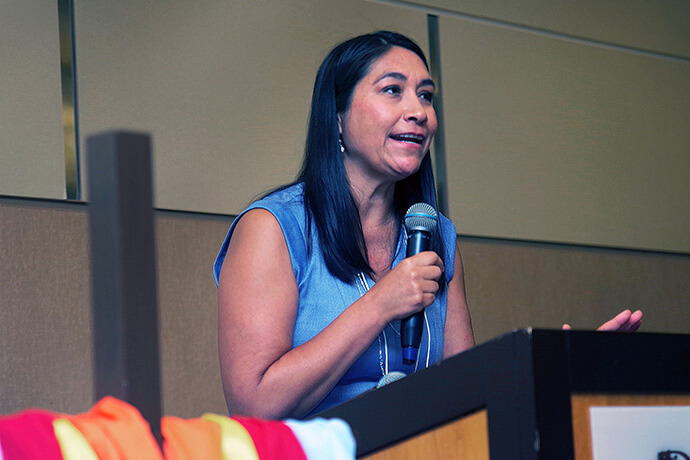
During the meeting, grassroots experiences from United Methodist congregations and missions were given a space to share what they have been doing. United Methodist Deaconess Cindy Andrade Johnson and the Rev. Dorlimar Lebrón reported on their ministry experiences working in the border areas of South Texas and New York City, respectively.
The Rev. Rodrigo Cruz, executive assistant to Bishop Robin Dease, who leads the North and South Georgia conferences, gave a presentation on the need to organize to take action on behalf of communities that are being affected by the actions of the federal government.
Cruz emphasized that the church already knows how it should act, as the message in the Social Principles is very clear. Based on Scripture, The United Methodist Church’s Social Principles affirm “the dignity, worth, and rights of migrants, immigrants, and refugees, including displaced and stateless people.”
“However, in many churches I have had to visit,” Cruz said, “what I find is a call to faith without deepening the awareness and action necessary for faith to be a real instrument of change — a romanticized and passive faith that contemplates the suffering of oppression and abuse and only waits for something to happen, when faith must have courage and a sense of urgency to impact these oppressive realities.”
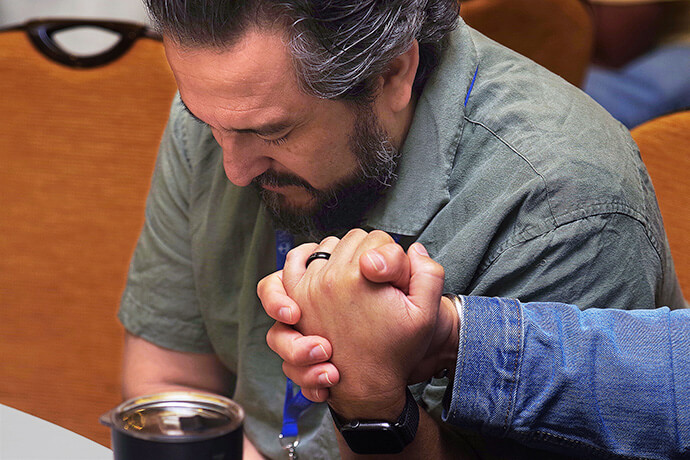
At a banquet, where funds are raised annually to strengthen the work of the caucus and advocacy ministries, the caucus recognized the Immigration Law and Justice Network; Estefany Sanabria, attorney for the National Immigrant Justice Center and a member of Humboldt Park United Methodist Church; and Susquehanna/Upper New York Bishop Héctor A. Burgos-Núñez for their careers as caucus leaders and their tireless work supporting the development of Hispanic-Latino ministries and congregations that advocate for justice and equity.
The Methodist Church of Puerto Rico received special recognition for the 125th anniversary of its establishment. Bishop Montalvo received the award and expressed her gratitude to MARCHA, an organization in which Puerto Rican Methodism has been associated since its beginning.
“Jesus calls us to make a difference. As we made one of the least of these, we made him also,” she said. “As Latin Americans, we must connect and unite our efforts, together with the march. Puerto Rico, too, we continue to march.”
MARCHA’s Escobar emphasized the importance of the caucus continuing to call on the denomination to live out the diversity and inclusion it preaches.
“It is necessary for our church, its lay leaders, bishops and agencies to act with greater courage, faith and bravery in the face of the growing injustices experienced by both our Hispanic-Latino community and other minorities in our society,” she said.
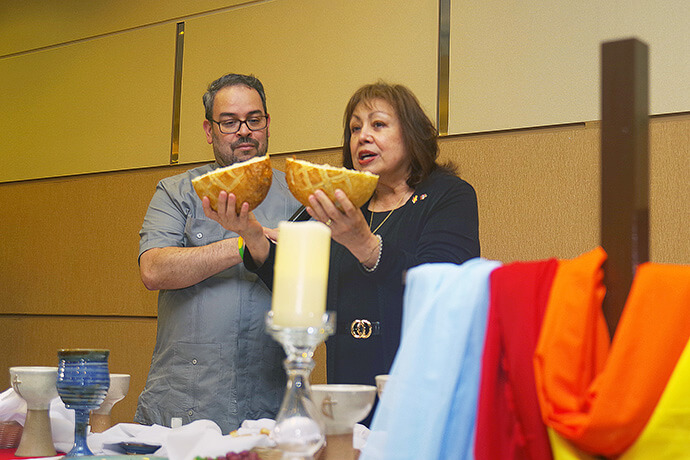
Reyes with the Immigration Law and Justice Network said that events like this meeting help to strengthen the values of the church so that it is more relevant in society and can reflect its faithfulness to God
“The fact that we can gather, be trained and even confront our own ways of thinking, helps us update the tools that both the church and community activists need to forge movements that create pressure for changes that establish a more united and humane immigration system,” he said. “Coming together as a community is definitely a necessary aspect, and in this way we see that yes, we can — as long as we are together.”
Retired Bishop Minerva Carcaño, chair of the Council of Bishops Immigration Task Force, acknowledged the challenges and importance of meeting in Chicago.
“It is a community that has declared itself a sanctuary, and there is much pressure against it. However, our presence here seeks to help and demonstrate that we — United Methodists, Latinos and Hispanics — stand with the city of Chicago and with the migrant. This is an opportune moment to show our support, and I thank God because I see how the pro-migrant movement is growing in The United Methodist Church.”
The caucus’ 2026 annual meeting will be held in Puerto Rico in August.
Vasquez is coordinator of Hispanic-Latino Relations for United Methodist Communications. To contact UM News, email [email protected] or [email protected].
